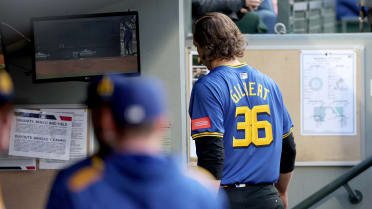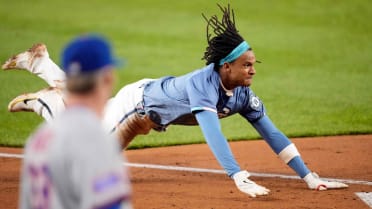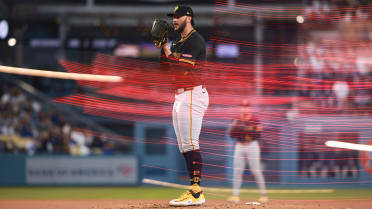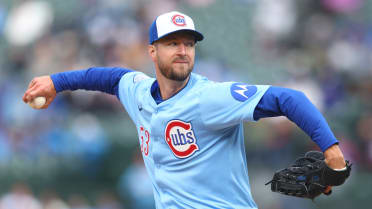SAN FRANCISCO -- Maybe, just maybe, time has provided enough opportunity for perspective and analysis that will give Will Clark a legitimate chance of gaining election to baseball's Hall of Fame.
Clark is among 10 former players, managers and executives who will be considered and subjected to a vote Sunday by a panel of 16 experts known as the Today's Game Era Committee. This group of Hall of Famers, esteemed baseball officials and longtime members of the media will convene at National Harbor, Md., site of baseball's Winter Meetings. Nominees must receive 75 percent of the vote to earn induction to the game's shrine.
Clark excelled for the Giants after they drafted him No. 2 overall out of Mississippi State in 1985. His career path initially appeared destined to end at the steps of Cooperstown. Unfurling his impossibly graceful left-handed swing, Clark homered off formidable fastballer Nolan Ryan in his first Major League at-bat in 1986, then sustained a stretch from 1987-91 in which he ranked as one of the game's premier offensive forces.
"When I played with him, I thought I was playing with a Hall of Famer," said Giants broadcaster Mike Krukow, a former member of San Francisco's starting rotation and a teammate of Clark's from 1986-89.
Clark faded from prominence from 1992-97, when he averaged 14 home runs and 74 RBIs per season. After making the All-Star team for five consecutive years (1988-92), Clark earned that distinction once in his final eight seasons and never in his last six.
Clark therefore received scant consideration when he became eligible for election to the Hall of Fame. The former first baseman received 23 votes among the 520 members of the Baseball Writers' Association of America who cast ballots for the Hall's Class of 2006. His 4.4 percent of the vote fell short of the 5 percent necessary to remain on the ballot.
But Clark's receiving a fresh look through the Today's Game Era Committee, which evaluates individuals whose primary contributions to baseball occurred after 1988. Ex-players joining Clark on the ballot are Harold Baines, Albert Belle, Orel Hershiser and Mark McGwire. Other nominees are managers Davey Johnson and Lou Piniella, former Commissioner Bud Selig, and club executives John Schuerholz and George Steinbrenner.
"The Thrill" would feel more than thrilled if he can capitalize on this second chance.
"That would be a big-time feather in the cap if that happens," said Clark, 52. "But if it doesn't, that's OK. Because I didn't play this sport to get into the Hall of Fame. I played this sport because of the challenge and competition. If it happens, I'll be the most ecstatic person ever, I can tell you that."
A closer look at Clark's statistics, as assembled by MLB.com staffers, could bolster the legitimacy of his case for the Hall. Clark's skeptics as well as admirers might be surprised to discover how his numbers compare with corresponding stats belonging to existing Hall of Famers -- including enshrinees whose names are the most hallowed in Giants history.
Start with some basics regarding Clark's lifetime figures. He hit .303; the Hall of Fame average is .302. Clark's batting average would rank him 80th among enshrinees with Buck Ewing, a catcher on the New York Giants' inaugural 1883 squad.
Many observers claim batting average is a poor indicator of a hitter's value. Nevertheless, it's worth pointing out that Clark, who also played for Texas, Baltimore and St. Louis, amassed 8,283 plate appearances. Of the 64 players to bat at least .300 in 8,000 or more plate appearances, 45 are Hall of Famers. The 18 who aren't, besides Clark, include a trio of active players (Miguel Cabrera, Albert Pujols and Ichiro Suzuki), three others on the current ballot (Vladimir Guerrero, Edgar Martinez and Manny Ramirez) and three more who'll appear on future ballots (Todd Helton, Derek Jeter and Chipper Jones). Another player in this category is Pete Rose, the all-time hits leader who remains banned from baseball.
Clark's .384 on-base percentage matches the figure compiled by Willie Mays, who needs no introduction. Tied with Mays for 57th among Hall of Famers in this category is another pre-1900s performer, outfielder Sam Thompson.
Clark's .497 slugging percentage would rank 44th among Hall of Famers, barely trailing the .499 recorded by Giants legend Orlando Cepeda. Clark also would have the 43rd-best OPS among Hall of Famers at .880, close behind Jackie Robinson's .883.
Clark combined impressive traditional statistics with enviable contemporary metrics during his aforementioned peak (1987-91), when he averaged 27 homers and 104 RBIs per season and posted a slash line of .304/.376/.522.
In four of those five seasons, Clark finished fifth or higher in National League Most Valuable Player balloting.
According to baseball-reference.com, Clark's 28.1 WAR (Wins Above Replacement) in that 1987-91 span topped all Major League first basemen. That figure ranked him sixth overall behind Barry Bonds, Wade Boggs, Cal Ripken, Rickey Henderson and Ozzie Smith. Coincidentally, Smith is a voter on the Today's Game Era committee that will decide Clark's fate.
Clark also led all big leaguers in this half-decade with a 153 OPS+, which incorporates ballpark factors. This was particularly significant for Clark, who played home games at pitcher-friendly Candlestick Park.
In baseball-reference.com's WAR per 162 games, which could be considered an accurate reflection of value per season, Clark ranks in the middle of the pack in a comparison with Hall of Fame first basemen. His 4.6 figure would rank 11th, preceded immediately by New York Giants star Bill Terry (5.1) and ahead of Willie McCovey (4.0) and Cepeda (3.8).
Not to be obscured was Clark's performance in the 1989 NL Championship Series against the Cubs. His Game 1 grand slam off Greg Maddux propelled him toward series MVP honors, which he garnered by hitting .650 (13-for-20) with eight runs scored, two homers and eight RBIs in five games. His tiebreaking two-run single in the eighth inning of the Game 5 clincher provided the margin of victory in the decision that sent San Francisco to the World Series.
If the voting committee considered intangibles, there'd be no debate regarding Clark, whose combination of substance and style galvanized Giants fans and rejuvenated the franchise.
"Will Clark brought some swagger back to the Bay Area," Krukow said. "We lost 100 games in 1985. I can't stress how hard that was and the pain that it put our fan base through. ... Will Clark brought relevance back to the franchise."
Former infielder Kevin Frandsen, who began his Major League career with the Giants in 2006, grew up in San Jose rooting for the Giants. Clark, said Frandsen, quickly gained iconic status among younger fans.
"In our age group, he was the example we would always use as a batting stance," said Frandsen, who played all or part of nine seasons in the Majors with the Angels, Phillies and Nationals, besides the Giants. "It didn't matter if you were right- or left-handed. You were going to emulate him -- the way he played, the passion, the fire. Every pitch mattered to him. The scowl, the fist-pumps, everything that went on with him made us fall in love with him."
Clark has claimed a permanent spot in the hearts of Giants fans. Earning a plaque at Cooperstown likely will be more difficult.
Chris Haft has covered the Giants since 2005, and for MLB.com since 2007. Follow him on Twitter at @sfgiantsbeat and listen to his podcast. MLB.com reporters Manny Randhawa, Oliver Macklin and David Adler contributed.



